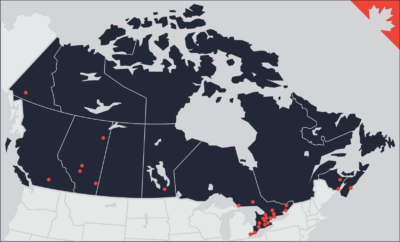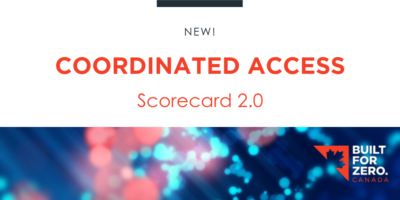Nine communities across the country are committing to functional zero chronic homelessness by joining Built for Zero Canada. This makes 33 communities planning to end homelessness with real-time data, Coordinated Access systems, community support and improvement practices.
 Nine communities are committing to solve chronic homelessness once and for all by officially joining Built for Zero Canada. This brings the change movement to a total of 33 communities, all of them intent on transforming their homelessness systems and proving that ending homelessness is within Canada’s reach.
Nine communities are committing to solve chronic homelessness once and for all by officially joining Built for Zero Canada. This brings the change movement to a total of 33 communities, all of them intent on transforming their homelessness systems and proving that ending homelessness is within Canada’s reach.
These new communities will join the 24 who are already a part of the national movement. Welcome to the team: Durham Region, Kingston, Kelowna, London, Niagara Region, Penticton, St. John’s, Winnipeg and York Region. With these additional communities, BFZ-C is now present in seven provinces and one northern territory.
“We are so excited to begin working with and sharing the successes of these additional communities. Homelessness is a solvable problem that has lost its sense of urgency,” says Marie Morrison, BFZ-C director. “BFZ-C symbolizes a changing national response to become more accountable to our homeless neighbours, with a shared belief that ending chronic homelessness is both urgent and possible as the first step to ending all homelessness in Canada.”
These nine communities will be part of the ongoing efforts to develop a quality By-Name List and have real-time data on its chronic homeless population, create a Coordinated Access system, and reduce its numbers until functional zero is reached. Communities such as Chatham-Kent, Medicine Hat, Saint John, Peterborough, and Guelph-Wellington have either reduced chronic homeless numbers significantly or have begun to develop the necessary tools to get there.
It’s about getting people into housing that works for them while simultaneously showing that ending homelessness is a realistic goal; because these innovative 33 communities are going to create a national tipping point, proving that ending chronic homelessness is possible across Canada.
BFZ-C’s goal is to help a core group of leading communities end chronic homelessness – a first step on the path to eliminating all homelessness in Canada. Its structured, supportive and data-drive approach focuses on creating a sense of urgency, optimizing local homeless systems, accelerating the adoption of proven practices and driving continuous improvement.
By supporting a leading group of Canadian communities to end chronic homelessness and by focusing efforts on those Canadians in the most urgent need across a broad range of populations (including youth, women, veterans, Indigenous Peoples and rough sleepers), BFZ-C intends to prove that reversing the lethal trajectory of homelessness in Canada is possible.
While BFZ-C received 16 applications in all, unfortunately due to limited resources, it was only able to add a limited number of additional communities at this time. Communities were selected based on the strength of their application with a preference for Reaching Home Designated Communities.
BFZ-C plans to add more communities in future. For more information or for resources about By-Name Lists, Coordinated Access systems and much more, visit bfzcanada.ca.
Coordinated Access Scorecard 2.0 Launches!
 Our brand new Coordinated Access (CA) Scorecard 2.0 launched just last week, and it’s available to communities across Canada!
Our brand new Coordinated Access (CA) Scorecard 2.0 launched just last week, and it’s available to communities across Canada!
This is the updated 22 question self-assessment tool to assist you to review and make improvements in your Coordinated Access system. The Scorecard includes three levels of quality: 1) Reaching Home, 2) Basic Quality, and 3) Advanced Quality.
Available on our Built for Zero Canada website on the Coordinated Access page. There is also a CA Guide to provide clarity and support to filling out the scorecard.
